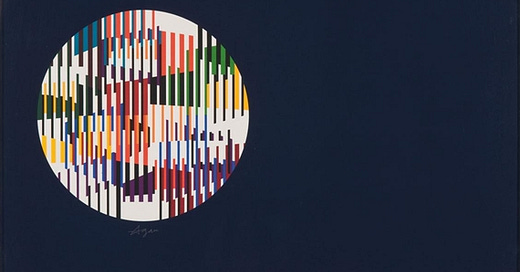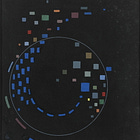Reading and Not Reading: Maiden Castle, 2
This is the second piece in a series of anti-reviews dealing, ostensibly, with John Cowper Powys.
Read Part I here.
The favorite writers of our favorite writers are often disappointing to arrive at by way of the former. I will expect the older writer, who influenced the more recent writer, to be an overwhelming, superabundant Titan of language who I would kick myself for not having known a day sooner. What is nearer to us in the chain of influence we, often falsely, expect to be of a lesser power, and so when we run our hands up the chain to the older link we expect to find something arcane and explosive in its force of quality.
In architecture, this principle usually holds, but in writing, as with painting, what came before can actually be lesser, more undeveloped and ungainlier than what lies nearer to us—not worse, but less refined, with a trickier valence.1
It is similar with translation: the translated work is not a worse version of the original2 but a distillate, arguably more powerful precisely because something is lost—because it is, in a sense, “lesser.” (Here, I am thinking of Walter Benjamin’s The Task of the Translator.) Something of what attracts me in Proust, for example, can be found in John Ruskin, one of Proust’s great influences, but in such a raw-material state as to be almost unrecognizable in its correspondence to what strikes us in Proust. It is the same with Henry Miller and D.H. Lawrence. While I can see the very threads that connect the spirit of their work, reading Lawrence after reading Miller is like eating a potato when you could be drinking vodka, in which most of the potato is obviously lost while something else, a much smaller part, is amplified and refined to the utmost. As I said, the two links in the chain are not worse but different in the proportionality of their powers.
But there are other cases, when the figures deeper in the past shine in all their singularity, and the figures nearer to us in time function as a kind of viewing glass that we can either look through or not look through at the older figure as we choose.
Robert Walser is a good example: he can be read through the lens of Kafka (who loved him and also overshadowed him) or not, and we are on fine ground in either case. W.G. Sebald was explicit about the influence that Thomas Bernhard had on his work and even called him, if I remember correctly, his “great teacher”. And yet one could almost read Bernhard as if he had come after Sebald, whose prose is so elementally perfect and solid (but visually solid, like a sky filled with clouds interspersed with hard, golden light).
So, at first, John Cowper Powys appeared to me as a potentially supercharged forebear, then as an undeveloped element, someone I could only appreciate by-way-of, as one appreciates, e.g., Herder by way of Goethe, the former in the wake of the latter. But Powys would not be so easily dismissed from my mind as secondary, no matter how Maiden Castle grated on me, and especially after reading accounts like the following, again from Miller:
But to get back to the man I know—from the lecture platform. It was John Cowper Powys, descendant of the poet Cowper, son of an English clergyman, with Welsh blood in his veins and the fire and magic which invests all Gaelic spirits [. . .]. I remember most vividly the way he wrapped himself in his gown, closed his eyes and covered them with one hand, before launching into one of those inspired flights of eloquence which left me dizzy and speechless. At the time I thought his pose and gestures sensational, the expression perhaps of an over-dramatic temperament. (He is, of course, an actor, John Cowper Powys, but not on this stage, as he himself points out. He is rather a kind of Spenglerian actor.)3
Could I give up so easily on a “Spenglerian actor” (Spengler: one example of a link in the “chain of influence” that is Titanic)? Give up on this crazy man wrapped in a gown at a podium, an imp-Satan who “fulminated with the fire and smoke of the soul[,]” and for whom “[l]iterature was [...] like manna from above”? Well, I did, but only temporarily. Reading all this of Powys so soon after abandoning him fertilized a different kind of interest in his work that I had not previously felt, an antagonistic interest. (The best music interests us antagonistically: we hear it for the first time and it is dissonant to us, alien in every way, but plants a seed that will germinate and grow into admiration sometime in the indeterminate future.) It also made me feel as if I was not reading, in general, as sensitively as I could have been.
Also, I should say: if it sounds as though I am gullible when it comes to reading the praise of one artist for another, this is something I can fully accept. One should be unashamedly gullible and listen very seriously in such matters. One should have what Hegel calls, in Kant’s thought, an “excessive tenderness for the things of this world” when these are indicated to you by someone who knows: if you find things lacking, you can attribute the defect to yourself, wherein lies that “tenderness” for things. And this applies just as much to friends as it does to the great artists of the past.4
Read Part 3 here:
Thanks for reading COM-POSIT! Subscribe to get the next piece when it comes out.
Merriam-Webster variously defines valence as “the degree of combining power of an element[ . . . ],” a “relative capacity to unite, react, or interact [ . . . ],” and “the degree of attractiveness an individual, activity, or thing possesses [ . . . ]”.
This seems to be the opinion held of translated work by people who want to appear conscientious about their reading and yet prefer having some excuse for not reading at all.
Henry Miller, The Books in My Life. New Directions. 1969. 136.
I am lucky enough to have a friend or two myself whose words of recommendation I listen to as though they were the directives of minor prophets because I am glad to place my trust in the fact that “they would know.” If they turn out wrong (and they rarely do), that is just the nature of prophecy and no stain on the judgment of my friends.






Wow, this is incredible!